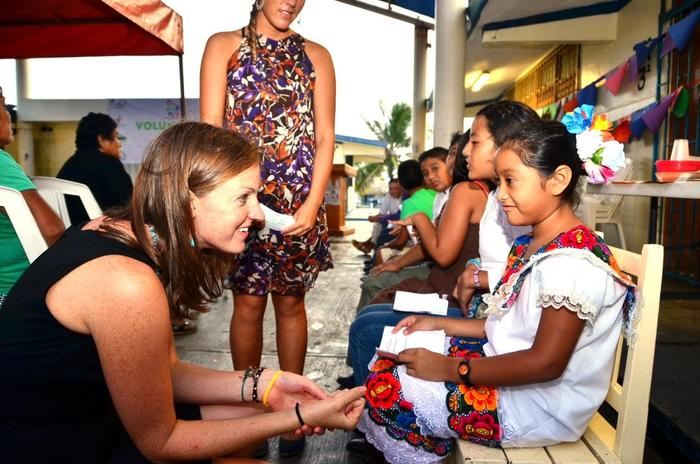Increasing Numbers Of US Students Choosing To Embark On Volunteer Tourism Gap Years http://bit.se/ityVZb
Volunteer Tourism and Third Sector
by Siana Amos, MNA ’17
The rapid growth of the volunteer tourism industry has sparked diverse debates among participants, researchers, and professionals. While some see international volunteering as invaluable, others question the impact and motives of participants and volunteer sending organizations. Critics have raised concerns over the role of sending organizations and the effect that commercialization has had on the nonprofit sector. These disputes have caused stakeholders and spectators alike to analyze the impact and potential ethical risks of these service opportunities. However, in spite of this controversial position, research suggests that the use of ethical learning frameworks could allow the volunteer tourism sector to use its recent popularity to enact change and do good.
The $173 billion volunteer industry attracts more than 1.6 million volunteer tourists each year and is one of the fastest growing trends in travel today (Kahn, 2014). While commercialization has significantly contributed to the growth of the industry, these business-like models and the rise of for-profit agencies are widely controversial within the social sector. Volunteer sending organizations serve to develop volunteer opportunities, arrange pertinent logistics, and facilitate relationships between volunteers and host communities. Those that hold 501(c)(3) statuses work to enhance social and environmental good, and maintain a commitment to invest all profits in organizational activities and programs. WorldTeach, a leading nonprofit sending organization, promotes itself as a key proponent of universal education and responsible global citizenship. Their two-fold organizational mission demonstrates their commitment to the students and host communities, as well as their sizable volunteer population. Global Volunteers seeks to organize international volunteer opportunities that embody their philosophy of sustainable development. This organization believes that adequately managed and supervised short-term programs have means to enact social change. In contrast, for-profit companies like Projects Abroad and Global Crossroad work to alleviate systemic injustices but do so in a manner that generates profits for stakeholders. This diversification has resulted in increased attention and contrasting reviews for the volunteer tourism sector.
The recent adoption of commercial methods has enabled and constrained international volunteer efforts. Although business-like models regularly increase financial success, these strategies often redirect efforts away from philanthropic goals and towards profitable advances. Commercial orientations force sending organizations to manage multiple stakeholder relationships and balance opposing dynamics that may arise if the needs and interests of consumers (i.e. volunteer tourists) fail to align with those of the receivers (i.e. local communities). Opponents of volunteer tourism argue that gaps in culture, background, and privilege create a lack of intercultural competence and sensitivity among Western volunteers. Critics have also questioned volunteers’ seemingly selfless motives given that several use the experience as means to build their resumes or college applications. Despite these various concerns, studies reveal that international volunteers thoroughly enhance organizational practices. Supporters argue that international volunteers continuously address labor shortage needs, provide resources, philanthropy, and social capital, increase the intercultural competence of local staff and clients, and introduce new skills and abilities to host communities (Lough, McBride, Sherraden, and O’Hara, 2011). However, while efforts clearly yield some valuable outcomes, the potential dangers of volunteer tourism demonstrate a need for improvement across the industry.
The use of ethical frameworks that prioritize empathy and respect in partnerships would be highly beneficial in intercultural contexts. The Fair Trade Learning Model is a global educational exchange that achieves reciprocity “through cooperative, cross-cultural participation in learning, service and civil society efforts” (Hartman, Paris, and Blache-Cohen, 2014). This model argues that equal partnership and transparency are essential to foster a just, equitable, and sustainable world. This framework believes that community-driven outcomes and volunteer learning are of equal importance, and argues that efforts are most effective when attention is given to community voice and direction. This approach envisions volunteer programs as mutual learning experiences and maintains that programs should implement reflection processes to complement volunteer experiences. The Fair Trade Learning Model believes that sustainability is possible if volunteers and partners are aware of how funds are used and if all contributions are aligned with the economic and social dynamics of local communities. As such, this comprehensive framework suggests that preparation, awareness, and reflection would produce ethically engaged programs and participants.
Volunteer tourism can also be applied through a transformative learning lens. Transformational learning sees dialogue and reflection as essential aspects of volunteer tourism and believes that both allow insights to be integrated into everyday life. This approach identifies self-actualization as an outcome of transformational learning and promotes critical thinking in the practice of volunteer tourism (Coghlan and Gooch, 2011). While volunteer tourism presents various challenges, the valuable and beneficial outcomes should not be overlooked. Thorough application of these learning frameworks would enable international volunteerism to move beyond the simple act of giving back and develop into an experience that is equally beneficial for volunteers, host communities, and society at large.

